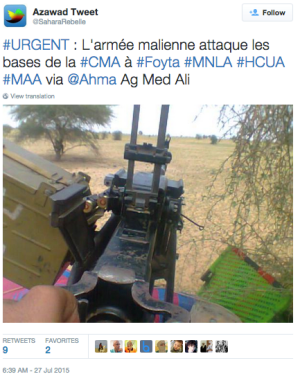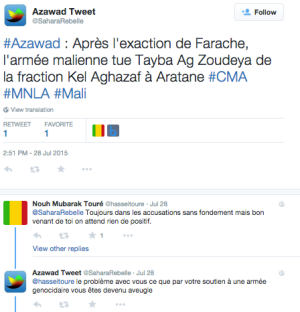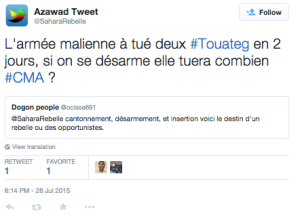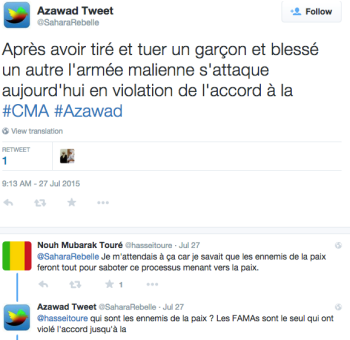27 July - 2 August, 2015
Contents
Compiled by André Capretti
- Peace & Reconciliation Process: Moving Forward
- Terrorism, Insecurity & Attacks
- Unreported Accusations Against FAMA
- MINUSMA’s Role
1. Peace and Reconciliation Process
State-owned media
L’ESSOR, “Mise en oeuvre de l’Accord de paix et de réconciliation nationale: Le rôle incontournable des partis politiques”, July 27th, 2015
- A conference was organized on July 25th in Bamako to provide a forum for debate and discussion on the role of political parties in the implementation and application of the peace accord.
- After a national poll revealed that 80% of Malians were not aware of the contents of the peace accord, strategies to increase popular participation and implication in the peace and reconciliation process have been much discussed.
- The conference brought together academics, politicians and members of civil society to discuss this issue, especially as it pertains to the role that politicians have in informing their constituents.
- In particular, emphasis was placed on the need for political parties to support the accord’s follow-up committee, as well as promote public debates on national reconciliation and transitional justice.
- For their part, political party leaders said they were aware of these issues and promised to do their best to help the efficient implementation of the accord, although they lamented the fact that they hadn’t been involved in the negotiation process in the first place.
L’ESSOR, “Sondage d’opinion: Mali-mètre jauge la perception de l’accord de paix”, July 27th, 2015
- The results of the Mali-Mètre national public opinion poll on the peace accord were recently revealed to the public.
- The poll demonstrates that 71.7% of citizens are most preoccupied with the issue of insecurity, while only 19% of the population is even aware of the contents of the peace accord. The survey also revealed that 59.% of the population do not trust the MINUSMA forces.
L’ESSOR, “Bilal Ag Acherif parle: Nous devons tous fournir des efforts pour donner une chance à la paix”, July 28th, 2015
- Bilal Ag Acherif, Secretary General of the MNLA, met with L’Essor newspaper for an informal interview, and declared that he was confident in regards to the safe and effective implementation of the peace accord, although he was worried that the pro-government rebel forces of the GATIA might be violating the ceasefire.
- Acherif said he was optimistic that the accord would be properly enforces, but stressed that it was extremely important that the government have a stranglehold over GATIA.
- Acherif also recalled that this was not the first time an accord had been signed, and that its success would depend on the good will of the signatory parties.
- Acherif declared that on his end the rebels would do all in their power to ensure the application was properly applied and respected, but that the government would be the principal actor in the application of the accord.
L’ESSOR, “Commission vérité, justice et réconciliation: Quel role pour la société civile?”, July 29th, 2015
- A workshop on the role of civil society in the efforts of the truth, justice and reconciliation commission took place recently in Bamako.
- This conference had as one of its objectives to form connections between civil society organizations that defend human rights, and those that defend victims.
Privately-owned media
JOURNAL DU MALI, “Blocages autour du Comité de suivi de l’accord d’Alger”, July 27th, 2015
- After the follow-up committee on the Algiers Accord agreed on definitive internal rules and regulations in their meeting on July 21st, the next challenge continues to be agreeing on the exact composition of the committee.
- Conflict has continued to revolve around the issue of which groups will have representatives, how many representatives they will have, and who those representatives will be.
- The main point of contention seems to be whether rebel groups who signed the accord independently of the CMA will be entitled to representatives. Observers are not surprised by the challenges faced in this regard, given the heterogeneous composition of the rebel movements.
LES ECHOS, “Gouvernement post accord de paix: Le grand test!”, August 2nd, 2015
- In the aftermath of the signature of the Algiers Accords, one of Mali’s greatest challenges will be the formation of a new government. This new government will have to reflect the country’s new political tendencies, as well as the commitments undertaken by the State vis-à-vis rebel groups.
- The coming months will see ministerial reorganization as a principal challenge, especially given that rebel groups will be demanding their due in this regard. Prime Minister Keita will face the challenge of respecting his promises to the rebels, while ensuring that key portfolios remain in safe and secure hands.
- Governmental changes also run the risk of aggravating pre-existing internal antagonisms, which could contribute to tension in Malian political society.
2. Terrorism, Insecurity & Attacks
Privately-owned media
LE PRÉTOIRE, “Kidal: La force Barkhane échappe de justesse à un attentat”, July 31st, 2015
- A landmine set by an unidentified individual in the downtown area of Kidal exploded on Monday July 27th. An armed vehicle transporting French armed forces was able to stop itself just before the detonation of an explosive device.
- No casualties or injuries were reported, although the incident remained worrisome nonetheless.
Foreign Media
REUTERS, “Two Malian soldiers killed in ambush – military”, August 2nd, 2015
- Two members of the Malian armed forces were killed, while four were injured in an ambush on Saturday that took place near Nampala in Central Mali.
- Armed men put explosives on a road near the border with Mauritania, in an area that has seen Islamic jihadist attacks launched in the past.
- The assailants set of their explosive devices to halt the advance of the armed forces, and then open fire on the men. Military reinforcements were sent to the region to help with the situation.
- Recent attacks in the region have been blamed on a newly emerged group called the Massina Liberation Front.
3. Unreported Accusations Against FAMA
See tweets below
Azawad Tweet @SaharaRebelle, July 27th, 2015
Recently many tweets have emerged from a singular twitter account, known as Azawad Tweet and reupted for its pro-rebel leanings, accusing the Malian armed forces of violating the ceasefire and attacking rebel forces bases.
Azawad Tweet @SaharaRebelle, July 28th, 2015
Tweet from Azawad Tweet accuses the Malian army of having killed a Touareg rebel known as Tayba Ag Zoudeya.
Azawad Tweet @SaharaRebelle, July 28th, 2015
Tweet 3 (again, from the same Azawad Tweet account) accuses the Malian army of having killed 2 Touareg rebels, and asks how many more would be killed if the army were to be disarmed.
Azawad Tweet @SaharaRebelle, July 29th, 2015
Once again, tweet 4 accuses the Malian army of shooting and killing a boy and injuring another, in blatant violation of the ceasefire and peace accord.




3. MINUSMA
State media
L’ESSOR, “Sondages défavorables à la MINUSMA: La defense de Radhia Achouri”, July 30th, 2015
- MINUSMA has been organizing press conferences to clarify its mandate and increase understanding of the purpose of its mission.
- MINUSMA spokesperson, Radhia Achouri, expressed himself in opposition of the positions conveyed by the majority of the population in the recent Mali-Mètre poll, which show that much of the population distrusts MINUSMA, and accuses them of not supporting the Malian army and instead supporting the rebel forces.
- Achouri stressed that MINUSMA’s mandate has always been apolitical, in order to strengthen the Malian political process, stabilize the country and help realize a number of security-related tasks. It does not have the necessary mandate to engage in local conflicts between belligerent groups.
- Achouri again emphasized that that MINUSMA’s role involved according priority attention to the major urban areas, transport routes, civilian protection the surveillance of human rights, the facilitation of humanitarian aide and assistance for displaced people.
L’ESSOR, “MINUSMA: 300 militaires nigériens attendus”, July 31st, 2015
- 300 Nigerian military men will be joining MINUSMA operations in the coming week. This added presence will reinforce MINUSMA’s capacity to uphold its mandate.
- Thus far, the MINUSMA forces consist of 9000 men, 3000 short of the objective set by the UN Security Council.
- During the same press conference that revealed the news, it was announced that 2 children had been injured by an I.E.D in Menaka on July 22nd.
Privately-owned media
LE RÉPUBLICAIN, “Général Hervé Gomart, chef d’état major de la Force de la MINUSMA à Kidal: Notre mission, la souveraineté totale du Mali et la sécurité des Maliens”, July 27th 2015
- French General Hervé Gomart was announced as the new Chef d’état-major of the MINUSMA forces on July 16th, and has now officially taken over the reins of this position.
- Gomart met with all the battalions and units on the field in Kidal (where MINUSMA is based), and reiterated that MINUSMA’s role is to assist Mali in regaining its total sovereignty, and to help its population live in a secure manner.
- Gomart will be commanding a military force that includes contingents from Nepal, Bangladesh, Cambodia, the Netherlands, Togo, Chad and Guinea, as well as elements of the United Nations Police.
- MINUSMA, in conjunction with UNPOL and the French Barkhane forces, continues to conduct patrols in Kidal and in the periphery of the city, in search of terrorists. These patrols have been credited with drastically reducing the amount of rocket attacks affecting the city.
- Gomart’s visit to Kidal also had the goal of exploring the possibility of reopening the Kidal airport, which has been closed for months due to issues of insecurity.
ABAMAKO.COM, “La MINUSMA appelle au strict respect du cessez-le-feu et des droits de l’Homme”, August 1st, 2015
- MINUSMA has condemned acts contrary to the spirit of the peace accord and ceasefire, as well as allegations of grave violations and abuses of human rights, that have been recorded in many towns, especially in the northern regions.
- MINUSMA spokesperson Mongi Hamdi noted that many of these acts were especially worrisome, as they seem to have been committed by movements and groups that signed the accord.
- Hamdi has continued to exhort the leaders of the concerned groups to focus their efforts on peace consolidation, and to demonstrate restraint and respect towards the peace accords.
- MINUSMA and its Human Rights Division have deployed field resources at its disposal to follow-up, investigate and monitor these alleged violations.
- Hamdi stated that the resolution of the Malian crisis was in a promising stage of dialogue and compromise, but that actions on the ground had to reflect this atmosphere. Hamdi stressed that the success of the peace process resides in the confidence and trust that exists between the different groups and parties involved, as well as the population’s confidence in the good will of the parties.